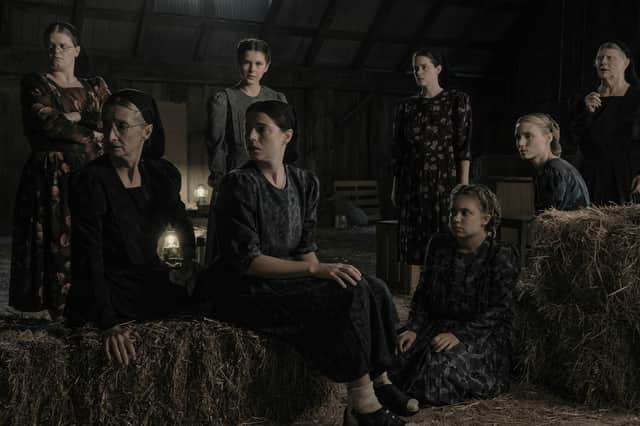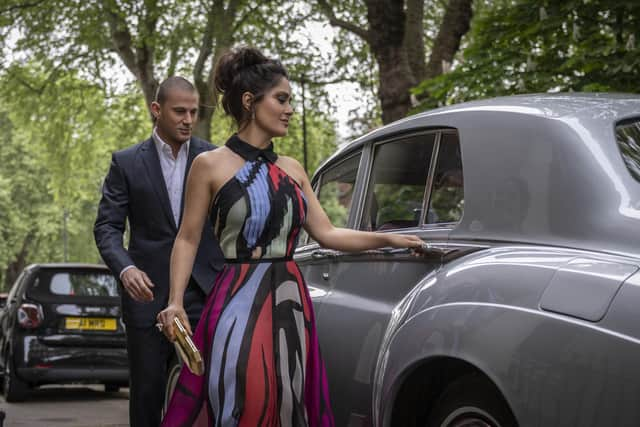Film reviews: Women Talking | Magic Mike’s Last Dance | Blue Jean


Women Talking (15) ****
Magic Mike’s Last Dance (15) ***
Blue Jean (15) ****
Oscar-nominated for best picture and best adapted screenplay, Women Talking marks Sarah Polley’s return to filmmaking after a decade-long absence by transforming Miriam Toews’ acclaimed novel of the same name into a smart #MeToo parable about the real horrors hidden by silence. Set in an unnamed agrarian religious sect somewhere in North America, the film revolves around a group of women and girls of all ages literally waking up to the fact that they’ve been drugged and raped in their sleep by the male members of their community. Inspired by a real incident in a Mennonite community in Bolivia in the early 2000s, this collective act of abuse has gone on for years, explained away – there’s no hiding the blood, the babies or the STDs – with talk of ghosts and Satan and flat-out denials. The women themselves have been denied education to keep them docile and obedient, but they’re no fools and now that the truth is out they’ve got a brief window while the men are dealing with the authorities to decide whether to leave the colony, stay and fight, or forgive their attackers.
Polley uses this ticking-clock structure to subtly ratchet up the tension as the women debate what to do while reckoning with their shared trauma. Rooney Mara’s pregnant Ona is the most measured in her response to what’s been done to her; Salome (Claire Foy) and Marchice (Jesse Buckley) – both mothers of young girls – are the most outwardly angry, while the older Greta (Sheila McCarthy) and Agata (Judith Ivey) provide a little perspective. Frances McDormand (the film’s producer) also has a small role as a community elder complicit in retaining the patriarchal status quo. Then there’s Ben Wishaw, cast here as the only man they trust enough to record the minutes of their meeting.
Advertisement
Hide AdDespite the harrowing subject matter and single location, the film is propulsive and moving and never feels stagey. Polley uses flash-cuts to hint at what’s occurred without explicitly showing us abuse and her deliberately heightened dialogue helps dramatise how these women are suddenly forced to use language in new ways to define themselves as autonomous human beings. Bolstered by a fantastic, flinty score by Hildur Guðnadóttir (and one disruptive use of the Monkees’ Daydream Believer), the end result is a vivid and complex exploration of systemic abuse and the need to create a safer and more positive world for everyone.
Channing Tatum’s male stripper odyssey draws to a close with Magic Mike’s Last Dance. Once again directed by Steven Soderbergh – returning after the second film coincided with his brief career hiatus – this third instalment uses the interim development of a live Magic Mike stage show in London’s West End as a jumping off point for yet another tongue-in-cheek film laying bare both its male cast and the uncertainties of the gig economy. As the film opens, the genial Mike is now 40 and making ends meet by bartending private parties (the pandemic has wiped out his furniture design business). Things start looking up, though, when he meets newly separated socialite Maxandra (Salma Hayek Pinault), who hires him to develop an exotic dance stage show in London to spite her ex-husband, whose family’s West End theatre she’s taken ownership of as part of their impending divorce settlement.


Fish out of water dynamics duly established, Mike soon finds himself a kept man in high society London with his own butler and only the vaguest idea of what he’s supposed to be doing. As plots go, it’s as thin as a gold lamé thong, but Soderbergh indulges his Anglophilia with ludicrous observations on the class system and wry narration from Maxandra’s precocious adoptive teen daughter, whose deadpan musings on Mike’s quest form the basis for a novel she’s in the process of writing. The dance sequences are typically outlandish, including a kind of semi-eroticised show-stopping spin on Singin’ in the Rain that leaves its star soaking wet and nearly naked. It’s corny stuff, but stylishly done.
Set against the Thatcher government’s introduction of the notorious Section 28 legislation banning the “promotion” of homosexuality in schools, Blue Jean seethes with quiet fury at the not-all-that-long-ago efforts to stamp out queer culture. It stars Rosy McEwen as the titular Jean, a Tyneside PE teacher not long out to her friends, but a long way from being comfortable in her own skin in public and still very much closeted at the school where she works. With a failed marriage behind her, she spends her Saturday nights idly watching the wincingly retrograde prime-time dating show Blind Date, much to the chagrin of her girlfriend Viv (Kerrie Hayes), who admonishes her for its insidious efforts to distract from real life.
“Not everything’s political,” sighs Jean, a statement she’ll gradually come to realise isn’t true as she’s forced to confront the fact that she can’t compartmentalise her private life when her employers and the government are trying to erase who she is in public. Debut writer/director Georgia Oakley teases out this theme by zeroing in on Jean’s awkward relationship with a new pupil (Scottish actor Lucy Halliday) who, at 15, seems instinctively more comfortable about her sexuality than Jean is with hers, but whose presence in the school poses problems for Jean’s ability to remain on the sidelines. If the plot gets little melodramatic in places, excellent performances and Oakley’s sure hand behind the camera see it through.